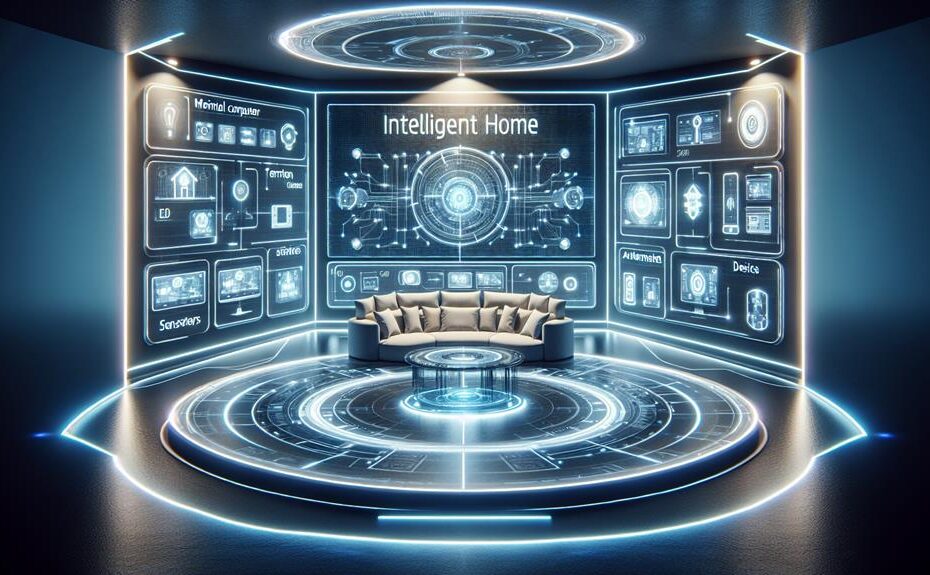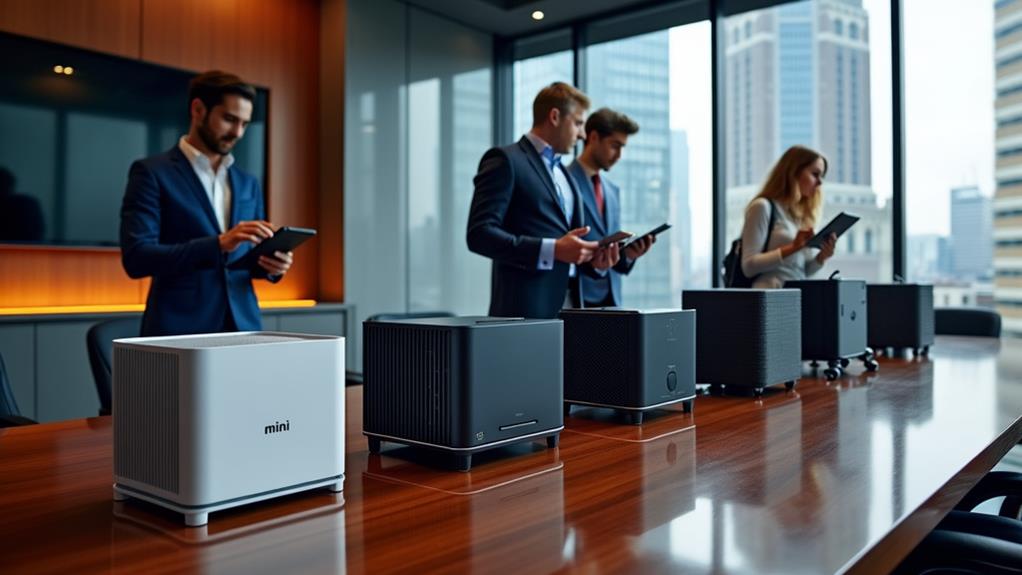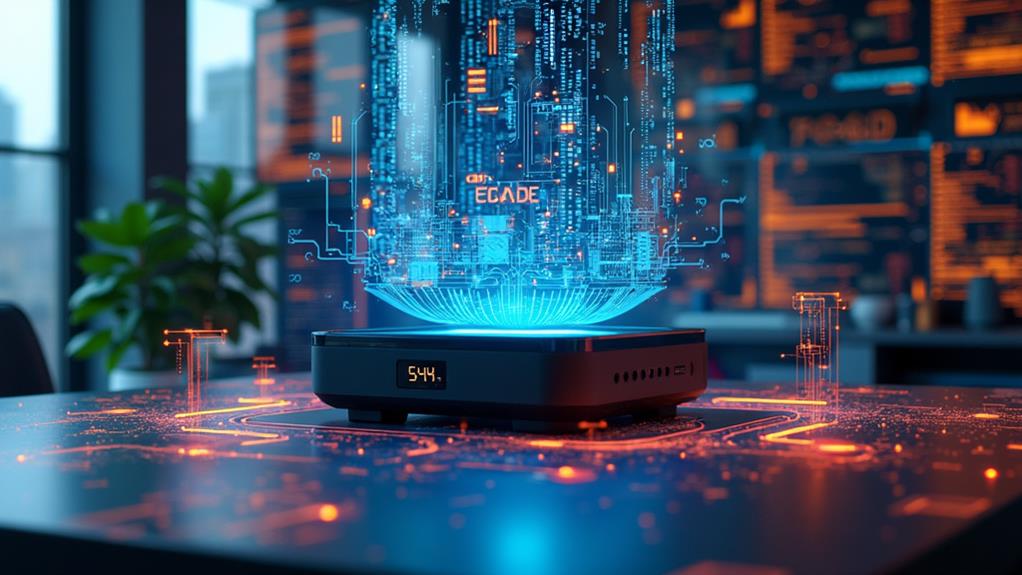



'Like a maestro conducting a symphony, you're looking to harmonize your home automation system with the perfect mini PC. With a plethora of options on the market, selecting the ideal one can be a challenging task. To find the perfect conductor for your smart home orchestra, you need to navigate through the sea of choices, considering factors like compact design, energy efficiency, and robust performance. But hold on to your curiosity, for we're about to set out on a journey to uncover the best mini PCs that will elevate your home automation experience.'
Key Takeaways
- Top mini PCs for home automation, like the GEEKOM MiniAir 11 and Intel NUC 11, offer powerful processors and robust connectivity options.
- Compact designs ensure low power consumption, quiet operation, and easy integration into smart home setups.
- Features like USB ports, Ethernet, HDMI, Wi-Fi, and expandable storage enable seamless control and communication with various smart devices.
- Home Assistant OS, a specialized Linux distro, is a popular choice for mini PCs due to its customization capabilities and reliability.
- When selecting a mini PC, prioritize processing power, memory (at least 8GB), and storage (128GB SSD or more) to ensure smooth operation.
Mini PCs for Home Automation
When it comes to choosing the perfect hardware for your home automation system, mini PCs offer a compact, energy-efficient, and powerful solution that can seamlessly run advanced software like Home Assistant. These computers are specifically designed to handle the demands of automating your smart home, providing reliable performance without breaking the bank.
One of the most significant advantages of using a mini PC for home automation is their compact size. This allows them to fit discreetly into any room, making them ideal for integration with various smart devices and sensors. Additionally, they are highly energy-efficient, reducing your overall energy bill and environmental impact.
In terms of processing power, many mini PCs are equipped with robust processors from leading manufacturers like Intel, making them capable of handling complex automation tasks. They also provide generous connectivity options, including multiple USB ports, Ethernet, and wireless connectivity, ensuring seamless integration with your smart home setup. What's more, many mini PCs support a variety of operating systems, including Linux-based distributions like Ubuntu Server, which can efficiently run home automation platforms like Home Assistant. With their cost-effectiveness and long-term reliability, mini PCs are an excellent choice for powering 24/7 home automation systems.
Top Performance Mini PCs
For high-powered home automation setups that demand robust processing and graphics capabilities, consider top performance mini PCs like the Intel NUC 11 Pro, Minisforum HX99G, and ASUS VivoMini VC66R, which deliver exceptional performance, versatile connectivity, and efficient energy usage.
Here are some key features to note about these powerful mini PCs:
- Intel NUC 11 Pro: With a powerful 11th Gen Intel Core i7 processor, it provides high-performance capabilities while maintaining energy efficiency.
- Minisforum HX99G: Featuring an AMD Ryzen 7 5800H CPU and Radeon RX 6600M GPU, it offers exceptional processing and graphics capabilities.
- ASUS VivoMini VC66R: Equipped with an 11th Gen Intel Core i5 or i7 processor, it provides a well-rounded balance of performance and energy efficiency.
These mini PCs are ideal for running Home Assistant with demanding tasks and multiple device integrations. They offer compact designs, robust performance, and versatile connectivity options such as Ethernet ports, USB ports, and SSD storage.
Compact and Energy Efficient
Compact mini PCs usually fit seamlessly into home automation systems without creating any noise disturbances or taking up too much space. These small form factor devices are designed to be discreet, making them ideal for home environments where minimal visual and noise impact are essential. With their low power consumption, home automation systems running on mini PCs keep energy bills to a minimum, making them cost-effective solutions.
Additionally, many mini PCs are energy-efficient, which, combined with their small size, guarantees they can operate continuously without generating excessive heat or noise. This quiet operation and compact design enable discreet integration into your smart home setup, confirming that your mini PC hub remains unobtrusive while maintaining effective performance. Overall, mini PCs offer a perfect blend of compactness, energy efficiency, and functionality, making them an excellent choice for home automation systems.
Choosing the Right Mini PC
To guarantee outstanding performance and effectiveness in your home automation system, start by identifying the right processor, RAM, and storage for your specific needs. To confirm seamless integration and management, look for a mini PC with a powerful processor such as Intel Core or AMD Ryzen, at least 8GB of RAM, and a fast SSD storage. These specs will enable your system to handle automation tasks and device integrations smoothly.
- Consider a Linux-based system like Home Assistant OS for ultimate customization and reliability.
- Ensure the mini PC has a wide range of connectivity options, including Gigabit Ethernet, multiple USB ports, and Wi-Fi 6 support.
- Opt for compact and energy-efficient designs that meet your smart home's environmental and aesthetic preferences.
Best Mini PC Models for Home
When selecting a mini PC for home automation, consider appealing options like the GEEKOM MiniAir 11. This compact device features an 11th Gen Intel Celeron N5095 processor, 8GB RAM, and 256GB SSD storage, making it both affordable and efficient for managing your smart home devices. Other notable choices include the Intel NUC 11 Performance Kit, which boasts an 11th Gen Intel Core i7 processor and supports up to 64GB RAM for seamless performance.
Another popular option is the Raspberry Pi 4 Model B, known for its low cost and energy-efficient ARM-based processor. This device is highly compatible with various home automation software and add-ons. For even more power, consider the HP EliteDesk 800 G6 Mini, which offers a range of 11th Gen Intel Core i5/i7 processors and up to 64GB RAM. The ASUS VivoMini VC66R Mini PC also provides a balance of performance and energy efficiency with its 8th Gen Intel Core i5/i7 processors and up to 32GB RAM.
All of these options guarantee reliable connectivity and storage for running Home Assistant smoothly. By choosing the right mini PC, you can effortlessly control and automate your smart home devices with ease.
Operating Systems and Memory
Operating Systems on Mini PCs for Home Automation
Running a seamless home automation setup relies on choosing the right operating system and guaranteeing sufficient memory on your mini PC. Two popular operating systems for home automation are Linux-based systems, particularly Ubuntu Server and Home Assistant OS (HAOS). HAOS is a specialized Linux distribution tailored specifically to run Home Assistant and can be installed on compatible mini PCs. Linux-based systems offer flexibility and reliability, making them ideal for home automation.
When it comes to memory, mini PCs typically offer 4GB or more of RAM, allowing for multiple smart home applications to run simultaneously. Some models support up to 32GB of RAM, providing room for memory-intensive tasks and future-proofing the system. This abundant memory guarantees that your home automation system operates efficiently and without performance issues.
- Linux-based operating systems like Ubuntu Server or Home Assistant OS (HAOS) are commonly used on mini PCs.
- Mini PCs typically offer 4GB or more of RAM for running multiple applications simultaneously.
- Some mini PCs support up to 32GB of RAM for future-proofing and handling memory-intensive tasks.
Connectivity and Expandability
In order to create a robust home automation system, choosing a mini PC that balances seamless connectivity with extensive expandability is essential. This means selecting a device that supports various connection options to integrate with numerous smart devices.
A reliable mini PC for home automation typically offers multiple USB ports, allowing you to connect a range of peripherals. Gigabit Ethernet ports guarantee stable and fast wired network connectivity, making it ideal for integrating smart home appliances. Wireless connectivity options like Wi-Fi 6 and Bluetooth further expand the reach of your home assistant to include devices without the need for physical connections.
Additionally, these mini PCs can be expanded with external storage options, such as M.2 SSDs or external hard drives, to handle growing data needs. Compatibility with multiple smart home protocols like Z-Wave and Zigbee ensures inclusive integration with your existing systems. With Intel Core-powered mini PCs and diverse connectivity options, you can build a seamless and efficient home automation setup. This focus on connectivity and expandability enables you to manage and control smart devices from a single, central hub.
Frequently Asked Questions
What PC for Home Assistant?
To set up a reliable home assistant server, consider mini PCs like the GEEKOM MiniAir 11 or Intel NUC. These devices offer powerful processing, high storage, and seamless connectivity, ensuring efficient and continuous home automation.
How Much RAM Do You Need for Home Assistant?
'That 4GB of RAM you have might not be enough. For Home Assistant, 8GB is preferred for better performance and handling multiple programs. Upgrading your RAM considerably improves responsiveness, especially with virtual machines.'
Is a Mini PC Good for Programming?
For programming, a mini PC offers many benefits like compactness, portability, low power consumption, and ability to run multiple OS options. It supports various programming languages efficiently and scales well.
What Is the Difference Between Raspberry Pi and Mini Pc?
"For home automation, consider Mini PCs' robust chipset capabilities and broader OS compatibility. They offer better performance benchmarks, thermal management, and I/O connectivity, making them ideal for demanding applications."
Conclusion
The perfect pick for seamless smart home integration is a powerful and compact mini PC. Placing priority on processing power and connectivity guarantees smooth automation. For energy efficiency, opt for compact, low-power models with quiet operation. Carefully selecting a model based on your needs secures robust performance, seamless integration, and insightful home automation.
Disclosure: As an Amazon Associate, I earn from qualifying purchases.






